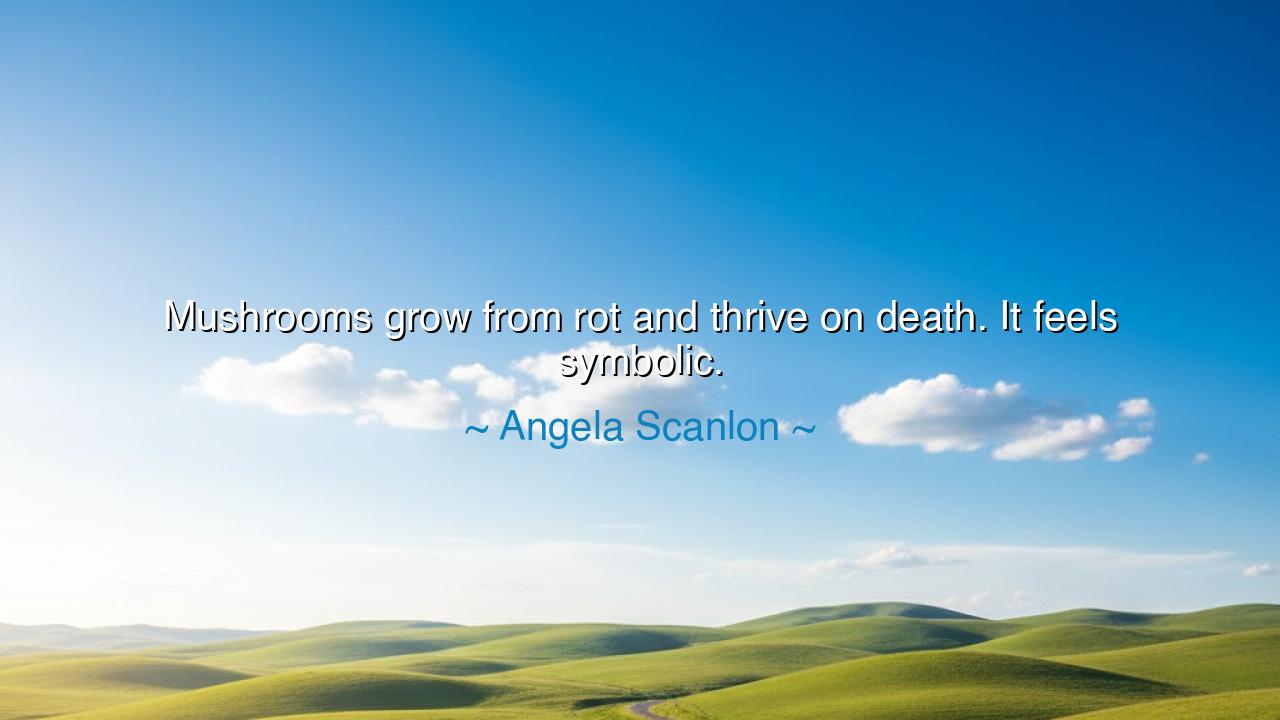
Mushrooms grow from rot and thrive on death. It feels symbolic.






In the hush of the forest, where old leaves become a soft cathedral underfoot, hear Angela Scanlon’s flint-bright line: “Mushrooms grow from rot and thrive on death. It feels symbolic.” In a few syllables she points to the world’s quiet alchemy: life rising from what has fallen, nourishment born of endings, sweetness distilled from ruin. The sentence is not bleak; it is bracing. It teaches that decay is not a verdict but a process, not a finish but a passage by which matter returns to meaning.
Taken as teaching, the line divides our inner weather. To honor rot is to honor renewal. The fungal kingdom, master decomposers, unweaves the bodies of plants and beasts and returns their threads to the loom—carbon, nitrogen, phosphorus—so that spring may have provisions for its feast. This is not metaphor only; it is ecology’s engine. Alongside bacteria, fungi break down the dead and cycle their gifts back into soil and air; many mushrooms live as vast mycelial webs, hidden and patient, turning loss into fertility and failure into food.
Thus the symbolic force: when we suffer endings—of seasons, vocations, certainties—the way through is often fungal. We let what is no longer needed decompose; we allow enzymes of honesty and time to work; and, beneath sight, networks of relationship and insight carry nutrients to roots we had forgotten. The visible fruit—the sudden idea, the new tenderness, the unexpected courage—erupts only after the long invisible labor. This is how forests heal; this is how souls do, too.
As for origin, the quotation is widely attributed to Angela Scanlon, the Irish broadcaster and writer, and appears in established anthologies of notable sayings. In those records it sits beside her confessed affection for mushrooms—“I’m obsessed with mushrooms, they’re beautiful”—underscoring that her remark is an observation of nature doubled as a philosophy of living: attend to what the forest teaches, and you will learn how to turn endings into openings. (The compendia preserve the wording, though a single first-publication interview is not isolated.)
Consider a modern parable. In the Netherlands, designers have begun crafting coffins from living mycelium—vessels that, once buried, help the body return gently to soil, enriching the ground instead of burdening it. The same organism that blooms as a mushroom in autumn becomes a companion at the end, hastening the earth’s reclamation and the garden’s future. Here the symbolic becomes practical: death literally feeds life, and mourning is braided with stewardship.
Or think of a humbler scene after a storm: a fallen beech, slick with rain, stippled by small caps overnight. A ranger explains to a child that these are not invaders but caretakers, digesting the log into food for ferns, into dark loam for saplings not yet conceived. The child nods gravely and pockets a leaf. Years later, during a private grief, that same grown child remembers the lesson: “What if I let this sorrow compost?” Slowly, faithfully, the memory becomes empathy; the toppled trunk becomes a thousand small kindnesses.
What, then, shall we learn from this forest proverb? First, do not fear rot that comes rightly—it is the world’s way of returning what cannot remain. Second, practice mycelial habits: build quiet networks of mutual aid, share resources under the surface, carry nourishment where light cannot yet reach. Third, keep a compost of the spirit: write down what has ended—projects, beliefs, resentments—and ask what nutrients they might yet release into your days. Let endings feed beginnings.
Carry Scanlon’s cadence like a charm in your pocket: Mushrooms, rot, thrive, death, symbolic. Say it when a chapter closes, when a plan fails, when an old self cracks like bark in spring. The forest has already written the wisdom upon the ground: let the fallen feed the future; let the hidden work until the fruit appears; let your life learn the art of turning loss into loam. Then, when you meet decay, you will not panic. You will tend it—knowing that, in due time, something small and bright will rise from the dark and call it good.






AAdministratorAdministrator
Welcome, honored guests. Please leave a comment, we will respond soon